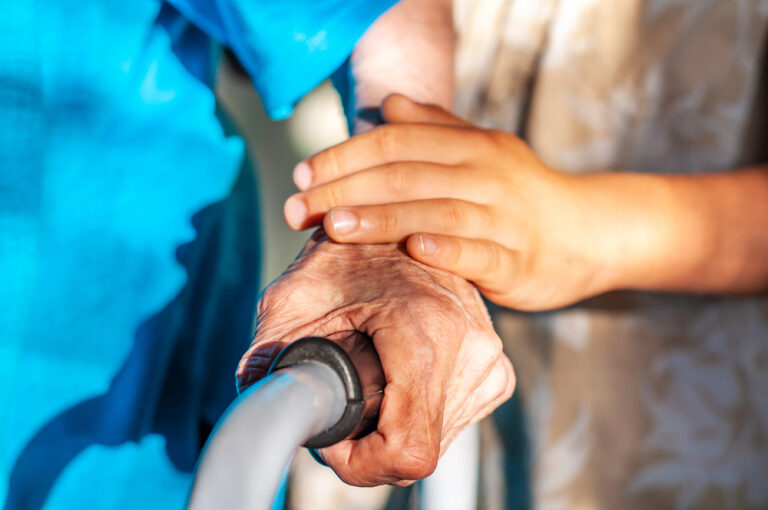by Tim SMITH
There’s one simple piece of advice for vulnerable people as a hurricane approaches: don’t try to weather the storm on your own.
Family, friends, neighbours and local church groups are just some of the people and organizations who can help ensure you stay safe when those fierce winds threaten to turn your world upside down.
Callan Bassett, the business development manager at Age Concern, a non-profit organization in Bermuda with a membership of approximately 5000 persons over the age of 50, says: “Our seniors are particularly vulnerable to the impact of hurricanes due to increased health issues, diminished awareness and mobility or transportation challenges. “We strongly advise older adults, and especially our seniors who are living alone, to either stay with family or have family stay with them during a hurricane.
This is particularly important for those with mobility issues. If there is an emergency once the hurricane hits, it would be very dangerous for family members to attempt to reach their relatives at that point. “Additionally, it is often difficult, if not impossible, to travel across the island in the immediate aftermath, as roads may be closed or obstructed,” says Bassett. “If seniors do not have a family member to rely on, it is important to organize their emergency plan ahead of time so that they are not left alone.”
He says this may include contacting friends, neighbours or churches for shelter or, if they have a budget, a local hotel room or AirBnB. Age Concern organizes preparation kits for its members and for its Client Services programme, and sends out tips on handling the storm. Prep kits contain enough essential supplies for two days, including at least one gallon of water a day per person, nonperishable and canned foods with a can opener, flashlight with extra batteries, candles, duct tape, first-aid kit with up-to-date supplies and personal hygiene items.
Seniors may also wish to add a battery-powered radio, blankets or sleeping bags, hand tools such as hammer, screwdriver or saw, pet supplies, battery-powered fan and medical equipment such as hearing aids, glasses, dentures and oxygen tanks, including a spare of each. People should also use a waterproof bag to store legal documents such as advance directives, birth certificate, social insurance card, insurance policies and financial records.
Bassett urges families to help their elderly loved ones by creating a hurricane preparedness plan. It should include establishing a trustworthy network of people in the community to call if a hurricane hits and they need assistance. Keep a designated list of local contacts in the event of an emergency and be sure to check in before, during and after a hurricane. Be aware of local shelters nearby and the best routes to get there. During the storm, people should stay informed and aware of their surroundings.
“Be sure to monitor the TV and radio to remain updated on any new weather patterns,” Bassett says. “The Bermuda Weather Service typically issues hurricane advisories within 48 to 72 hours of a tropical storm threat. Have local emergency contacts and phone numbers easily accessible. Charge your cell phone and fill up your gas tank when hearing an advisory warning.”
Storms can be frightening experiences, but there are some methods of relieving anxiety.
“It’s no secret that preparing for and anticipating a hurricane can be very distressing, especially for our seniors,” he says. “There may be uncertainty ahead about living arrangements, work, health and safety and other important life factors. Recognizing these common emotional reactions and taking steps to prepare for the hurricane will be helpful in safeguarding the emotional well-being of our seniors.”
He gives the following advice on managing hurricane-related fears and anxiety:
Close your eyes and work on breathing techniques. One effective technique includes breathing in for four counts, holding for four counts, exhaling for four counts and holding out for four counts. Moving your breath in and out of your body at an even pace helps bring down your anxiety. It will help you feel relaxed and calm.
Do positive visualization of the best possible outcome of the storm. This includes visualizing minimal damage, where everyone will be okay and no one will get hurt. Play a positive scenario out and believe it will come to pass.
Have faith. Many of our older adults are inherently religious or spiritual people. Rituals of faith such as prayers, hymns or meditations can offer great comfort in distressing times.
Read a good book. Getting caught up in a good story can help take your mind off your surroundings. Research books ahead of time to give yourself a few different reading options.
Steve Cosham, Bermuda’s national disaster coordinator, urges families to look out for their elderly relatives. “If they’ve not got family with the ability to look after them, they should get in touch with the local church. You can also ask people who live nearby to check on them afterwards.”
Cosham points out that storms can also be precarious times for families with sick relatives and pregnant women. Ahead of the storm, doctors contact all women in their third semester, and those near their delivery date or with a problem pregnancy. Plans are also in place for people who need dialysis or those with other urgent medical conditions. Some will be advised to get treatment before the storm comes, others will be booked in for treatment immediately afterwards and some will need to ride out the storm in the hospital.
“If people are medically vulnerable, the doctor knows about it and can liaise with the hospital and make the necessary arrangements,” Cosham says.

